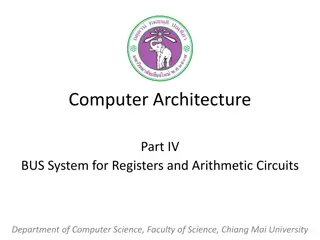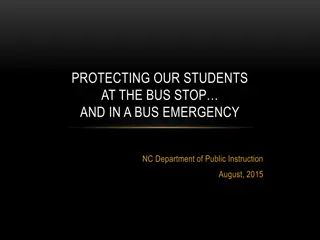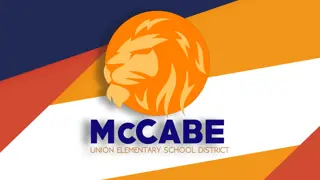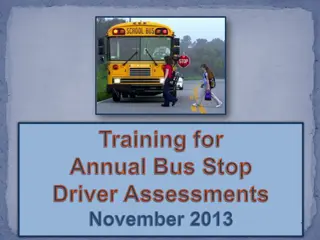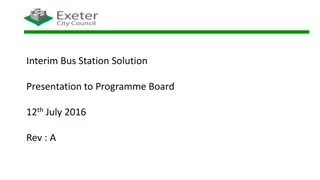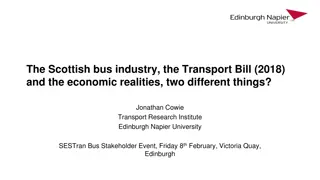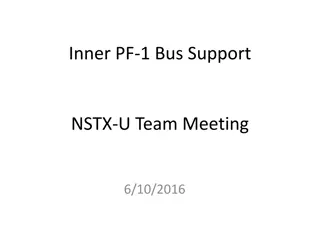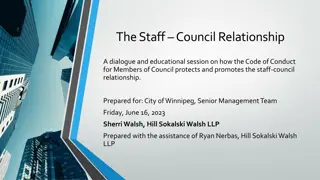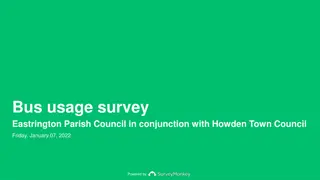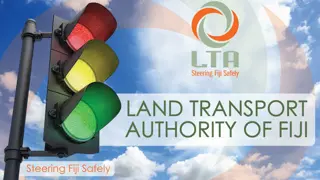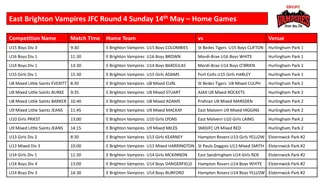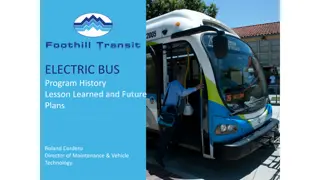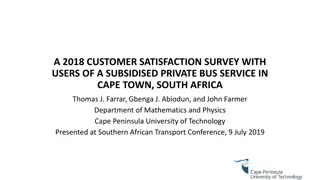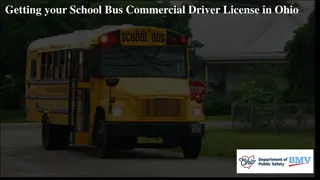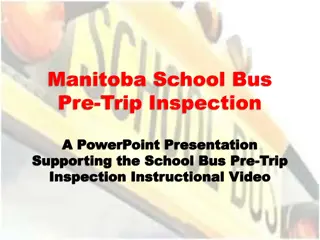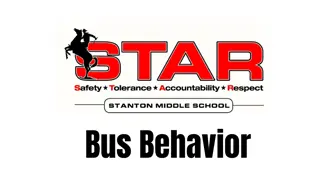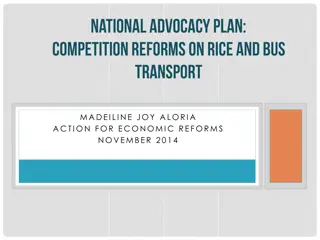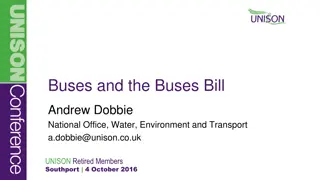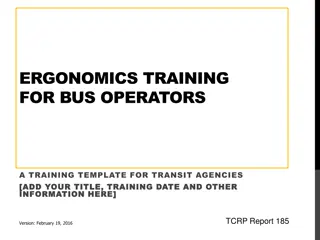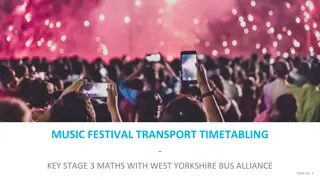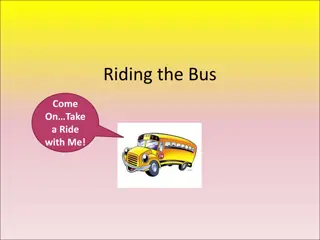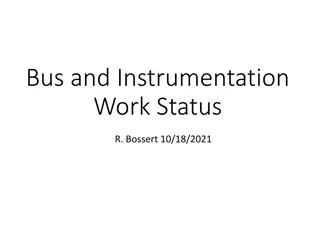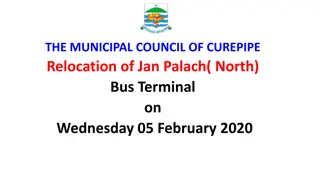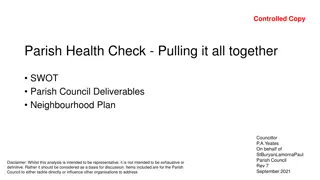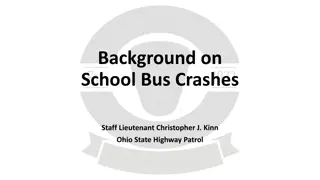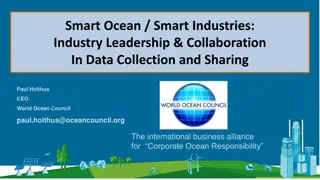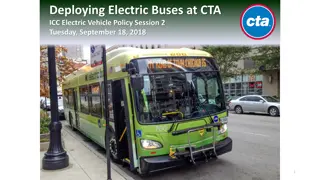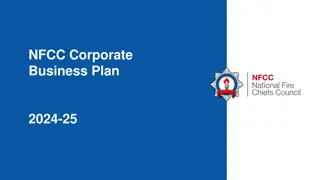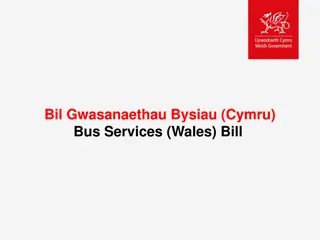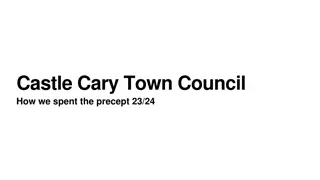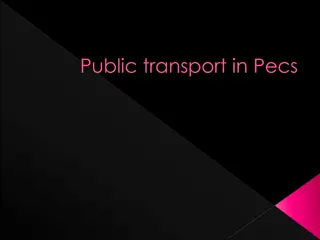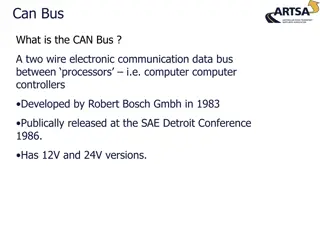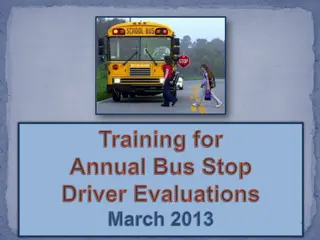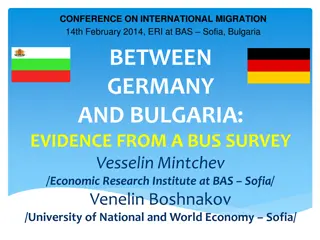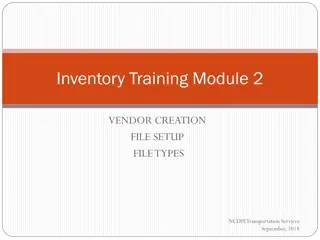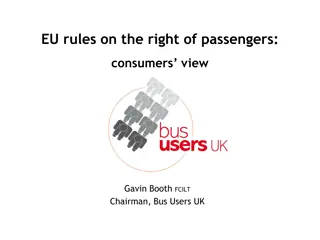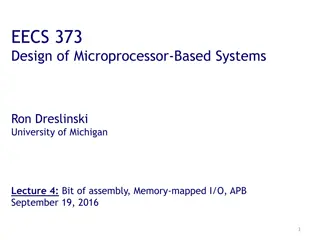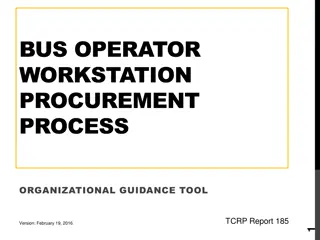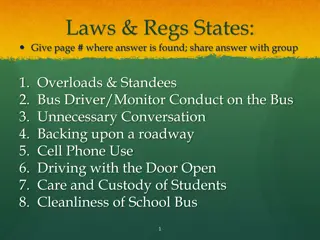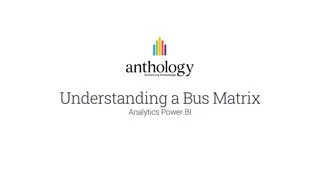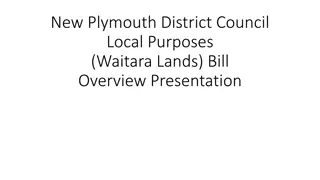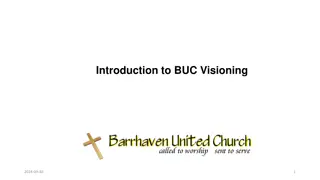Business Plan: New Brighton Council Bus Service Overview
This business plan outlines the strategy for the New Brighton Council Bus Service (NBCB) in response to the suspension of Brighton Council's bus operations. The plan covers macro-environmental analysis including political, economic, social, and technological factors, as well as a SWOT analysis highlighting strengths, weaknesses, opportunities, and threats for NBCB's success in offering local bus services.
Download Presentation

Please find below an Image/Link to download the presentation.
The content on the website is provided AS IS for your information and personal use only. It may not be sold, licensed, or shared on other websites without obtaining consent from the author. Download presentation by click this link. If you encounter any issues during the download, it is possible that the publisher has removed the file from their server.
E N D
Presentation Transcript
Business Plan for New Brighton Council Bus Service (NBCB)
Business Plan Overview This plan will highlight the business plan of the New Brighton Council Bus Service (NBCB). Brighton Local Council has decided to suspend the Brighton Council bus operations. Therefore, there is a market for local bus services.
Macro Environmental Analysis Political factors Kick-start funding to help subsidise bus services where commercial routes were not viable was reduced to 15 million pounds (Butcher, 2013). Rural Bus challenge where local authorities bid for funding for schemes based on innovation was completely scrapped (Department for Transport, 2012). Better Bus Areas Fund was launched to foster partnerships between local authorities and bus operators aimed at reducing congestion and providing better information to passengers. The funding would be increased to 5 million GBP in 2014, giving local transport authorities up to 5 million to spend in 2014-15 (Department for Transport, 2012). Possible lack of support from the council to launch bus services.
Macro Environmental Analysis Economic factors The Department of Transport presents a new National Bus Model which will promote a 20% reduction in subsidy (Department for Transport, 2012). The reduction in subsidy will impact services in Brighton s urban areas by -1% and rural areas by -2% (Butcher, 2013). There is an increase in fares in the urban and rural areas by 2%, leading to a reduction in patronage by 1-3%, which will impact income of NBCB (Butcher, 2013). Operating revenue of buses in metropolitan areas of the UK increased by 2% in 2012 and only by 0.8% in 2013, indicating a possible reduction in overall income (Keynote, 2014).
Macro Environmental Analysis Social and technological factors More than one third of the families in Brighton do not own a private vehicle, which may translate to more people using NBCB. BHLIS (2014a) reports that many people prefer to walk or cycle to work as they are conscious of ecological impact. These people can be targeted. Monitoring of bus routes and real time update of bus locations will help improve efficacy of operations (BIS, 2012).
SWOT Analysis Strengths Experienced employees Local community support Large market share Opportunities Increase in population Improvements in technology features of buses Improvement in quality features of the bus SWOT Weaknesses Lack of managerial experience Need for extended financial support Competition with other public modes of transport Threats Increase in private transport Increase in cost of fare Increase in private operators entering the arena
Customer Segmentation More than a third of the households in Brighton are one person households (36.4%). One in five people is from the BME (Black and Minority Community) (BHLIS, 2014). When compared to South East regions (60.8%), only 37.2% of people travel to work by private transport. 38.2% of households do not have a car or a van. 13.6% of residents use buses (BHLIS, 2014a).
Value Proposition Technology provisions Increase in number of services during the office hours (mornings 8-10am and evenings 5-7pm) (BHLIS, 2014a). Providing Wi-Fi services on certain routes. Student concessions Provide monthly pass for students. Service for the elderly Provide special services which will have a greater number of stops for senior citizens. Optimal modal mix Provide cycle stands in specific NBCB bus stops to help increase the number of people who may prefer to travel part way using bicycles (Redman et al., 2013). Increasing non-fare revenue Use the bus as an advertising medium to generate additional revenue streams.
Channels Awareness Evaluation Purchase Delivery After Sales To raise awareness of the new services of the NBCB, advertising on some of the buses, bus stops and local newspapers is to be carried out To help increase customer value and interest in service, unique services like those for students and senior citizens are promoted. Use of technology and optimal modal mix helps generate value. Customer purchase of services is direct sales in buses. Indirect sales through monthly passes in bus depots are also seen. Value is delivered by maintaining on time services and by ensuring quality of service. Customer feedback is welcome with feedback forms on every bus route and bus depot. The website which is to be launched will have a feedback column for passengers to raise complaints or suggestions.
Bus Operator Income in the UK Government Support Passenger Receipt 3500 3000 2500 2000 1500 1000 500 0 2009 2010 2011 2012 2013 Revenue Streams Government support for public transport has reduced significantly over the last five years (Keynote, 2014).
Revenue Streams Fare paying passengers 60% of the income generated is from fare paying passengers who directly contribute to the success of the business. Government reimbursements Government policy clearly identifies that the members who are of pensionable age are allowed travel for free on the local bus services in England (Massey, 2014). This will contribute10% of the total income. Tendered contracts The organisation will operate commercial contracts for universities and schools. Some of the rural routes and school buses which are not commercially viable are tendered by the government (CFBT, 2014). This will contribute 20% of the total income.
Customer Relationships Customer Retention Increasing accuracy of bus timings and quality of services offered. Customer Acquisition The continued use of NBCB as a result of the suspension of Brighton Council Bus services. Increase in customer use due to value propositions.
Operations Management Bus ownership Bus management Fare management Depot Bus maintenance Governance Proposed frequency and hours of operation Fuel source
Human Resource Management Maintenance Manager Employees (10) Service Manager Employees (4) Operations Head Controllers (5) Operations Manager Drivers (30) Chief Executive Officer Finance Manager Employee (1) Marketing Manager Employees (2) HR Manager
Pricing Management The prices of the NBCB will be the same as the ones previously promoted in the region (BCB, 2014). The tickets can be bought using mobile phones, smart cards or by using cash. The mobile phone/internet tickets can be purchased using the website and the smart cards are topped up at the depots and select locations around the city. Apart from the tickets which are issued for regular buses, special buses fares are also developed.
Start Up Costs Start Up Costs IT and computers Telephones and broadband Buses x eight (purchase) Professional fees Insurance Maintenance related equipment Marketing Licenses Training Advertising Buses x eight (rental) Wages/recruitment Security/health and safety equipment 5,000.00 2,000.00 300,000.00 1,000.00 30,000.00 30,000.00 3,000.00 10,000.00 1,000.00 2,000.00 100,000.00 10,000.00 3,000.00 Market research costs 1,000.00 498,000.00 100,000.00 100,000.00 TOTAL Wi-Fi enabled buses Establishment of stops for senior citizen buses Cyclist parking areas 50,000.00
Operational Costs Operational Costs Telephones and broadband Fleet management and 2,000.00 7,000.00 maintenance Marketing Wages Training Advertising Office supplies Security/health and safety 1,000.00 62,500.00 1,000.00 2,000.00 1,000.00 500.00 equipment Fuel 50,00.00 127,000.00 TOTAL
Projected Profit and Loss for Six Months Month Month Month Month Month Month 1 2 3 4 5 6 Total sales 130,000 132,000 135,000 138,000 140,000 142,000 Less direct costs 127,000 128,000 129,000 129,000 133,000 140,000 Gross profit (sales less direct costs) 3000 4000 6000 9000 7000 2000 Gross profit margin (gross profit divided by total 2.31% 3.03% 4.44% 6.52% 5.00% 1.41% sales x 100) (A)
Capital Budgeting for New Projects System Cash Flow A- Wi-Fi buses Discount B- Senior citizen bus stop Discount Discounted Discounted Factor 10% Savings Factor 10% Savings Cost Inflow Year 0 Year 1 100,000.00 35,000.00 100,000.00 25,000.00 0.909 31,818.00 0.909 22,727.00 Year 2 40,000.00 0.826 33,040.00 25,000.00 0.826 20,650.00 Year 3 45,000.00 0.751 33,795.00 25,000.00 0.751 18,775.00 Year 4 45,000.00 0.683 30,735.00 30,000.00 0.683 20,490.00 Year 5 45,000.00 0.621 27,945.00 30,000.00 0.621 18,630.00 Total of Inflow 210,000 157,333 135,000 101,272 Formula NPV= Discounted Savings - Initial Cost Calculation Discounted Savings 157,333 101,272 Cost -100,000 -100,000 Net Present Value 257,333 201,272 Net Present Value Z57,333 201,272 Recommendation Since the Net Present Value for System A is more than that of System B, it is recommended that System A be chosen.
References BHB 2014. Bus fares. [online] Available at: http://www.buses.co.uk/ [Accessed: 31 March, 2014]. BHLIS 2014. CENSUS BRIEFINGS- City Profile . [online] Available at: http://www.bhlis.org/census2011 [Accessed: 31 March, 2014]. BHLIS 2014a. CENSUS BRIEFINGS- Transport . [online] Available at: http://www.bhlis.org/census2011 [Accessed: 1 April, 2014]. BIS 2012. Government Response to the Competition Commission s report Local bus services market investigation. [online] Available at: https://www.gov.uk/government/uploads/system/uploads/atta chment_data/file/31883/12-689-government-response-competition- commission-local-bus-services-investigation.pdf[Accessed: 2 April, 2014].
References Butcher 2013. Buses: grants and subsidies. Business and Transport. London. HMSO Campaign for Better Transport 2013. Buses in crisis A report on bus funding across England and Wales . [online] Available at: http://www.bettertransport.org.uk/files/Buses_In_Crisis_Report_AW_P DF_09.12.13.pdf [Accessed: 1 April, 2014]. CFBT 2014. Understand the processes How buses are funded. [online] Available at: http://www.bettertransport.org.uk/local_campaigning/online_guide s/better_buses/understand_processes/bus_funding[Accessed: 2 April , 2014]. Department for Transport 2012. Reforming bus subsidy in England. [online] Available at: https://www.gov.uk/government/uploads/system/uploads/attachm ent_data/file/9110/impact-assessment.pdf[Accessed: 31 March, 2014].
References Keynote 2014. Bus Operators in UK. 12th ed. London. Massey 2014. Boom in free bus passes... but no buses: Pensioner perk so popular councils forced to axe services to pay for it. [online] Available at: http://www.dailymail.co.uk/news/article- 2570718/Boom-free-bus-passes-no-buses-Pensioner-perk-popular- councils-forced-axe-services-pay-it.html[Accessed: 30 March, 2014]. Redman, L., Friman, M., G rling, T. and Hartig, T. 2013. Quality attributes of public transport that attract car users: A research review. Transport Policy, 25, pp.119-127.


